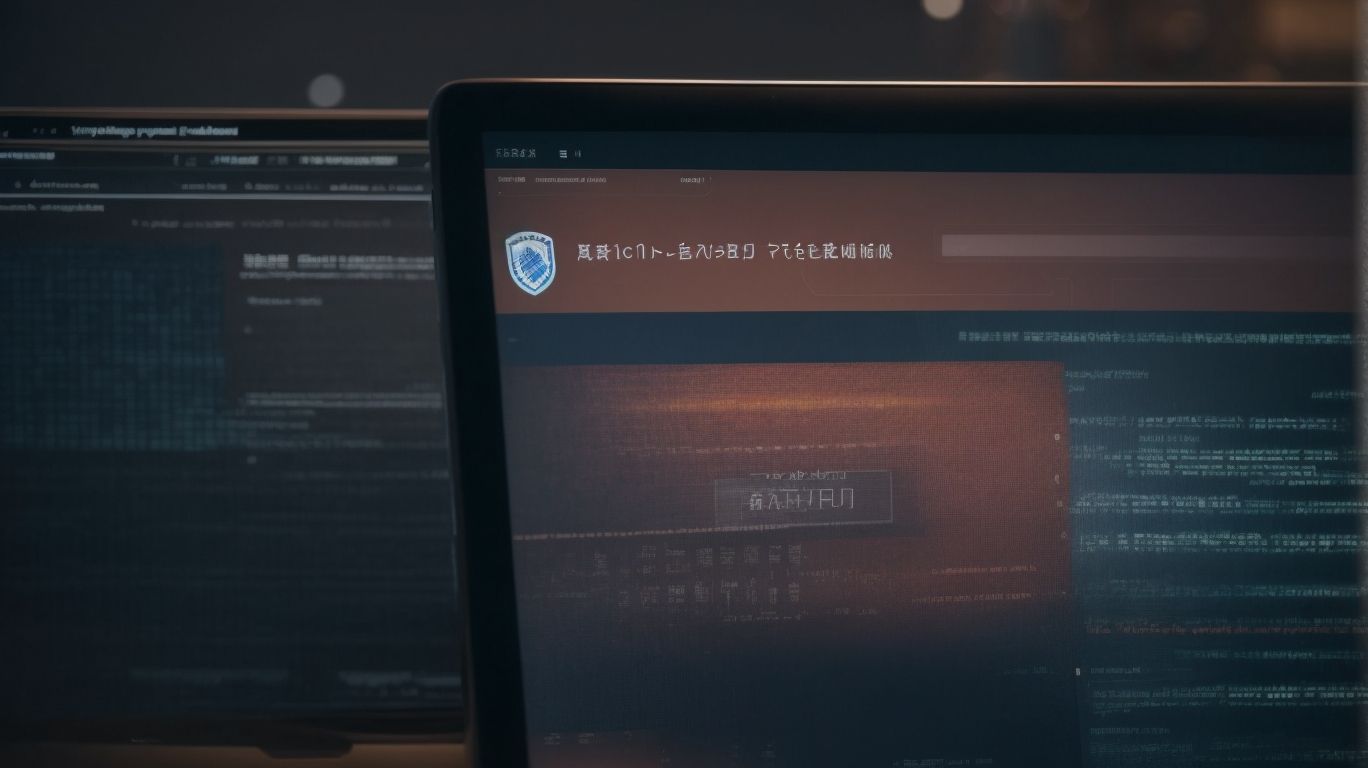In today’s digital age, cybersecurity is a critical concern for website owners. With the increasing number of cyber threats, it’s essential to understand the importance of safeguarding your website from potential attacks.
From malware to DDoS attacks, the consequences of a cyber breach can be severe, leading to data loss, financial damage, and reputational harm. In this article, we will explore the common cyber threats for websites and provide practical tips on how website owners can protect their websites from cyber attacks.
Whether you’re a small business owner or a large corporation, having a solid cybersecurity plan in place is crucial for the safety and success of your website.
What is Cybersecurity?
Cybersecurity encompasses the measures and practices employed to safeguard digital systems, networks, and data from unauthorized access, cyber attacks, and potential threats in the online environment.
Cybersecurity plays a critical role in ensuring internet security. It protects against various forms of malicious activities, such as malware, phishing, and ransomware.
By safeguarding digital assets, including sensitive information, financial data, and intellectual property, cybersecurity is essential for preventing unauthorized exploitation or theft.
Moreover, cybersecurity promotes online safety and privacy, building trust and confidence in the digital world. This allows individuals and organizations to operate securely and with peace of mind.
Why is Cybersecurity Important for Website Owners?
Cybersecurity holds paramount importance for website owners as it directly influences the protection of their online assets, the mitigation of cyber risks, and the prevention of potential cyber attacks that could compromise information security and user data.
By integrating robust threat detection systems, website owners can proactively monitor and identify unauthorized access attempts, malware, or other malicious activities.
The implementation of effective security measures such as encryption, firewalls, and regular security updates further strengthens the website’s defense against cyber threats.
Managing cyber risks involves staying abreast of evolving threats, conducting regular security assessments, and educating staff and users on best practices to safeguard against cyber attacks.
What are the Consequences of a Cyber Attack?
A cyber attack can lead to severe consequences such as a data breach, compromising sensitive information, and necessitating extensive risk management strategies, including thorough security audits and heightened cyber awareness.
This can result in financial losses, damage to reputation, and legal liabilities for the affected organizations. Therefore, it is crucial to implement robust risk management practices to prevent and mitigate cyber threats.
Regular security audits are essential in identifying vulnerabilities and ensuring that security measures are up to date. Cyber awareness among employees and individuals is also imperative to reduce the likelihood of falling victim to phishing scams, malware, or social engineering tactics.
What are the Common Cyber Threats for Websites?
Websites face various common cyber threats, including malware, phishing attacks, DDoS attacks, SQL injections, and cross-site scripting (XSS), necessitating robust web security measures, website protection, and proactive threat detection.
These threats pose significant risks to the integrity and functionality of websites, often leading to data breaches, financial losses, and reputational damage.
Malware can infiltrate web servers and compromise user data, while phishing attacks exploit user trust to steal sensitive information.
DDoS attacks can disrupt website availability, and SQL injections and XSS can manipulate databases and compromise user sessions.
To safeguard against these threats, businesses need to prioritize website security, implement encryption protocols, and deploy vigilant monitoring and detection systems to counter evolving cyber risks.
How Can Website Owners Protect Their Website from Cyber Attacks?
Website owners can protect their websites from cyber attacks by using strong passwords, keeping software and plugins up-to-date, implementing firewalls and antivirus software, regularly backing up data, and training employees on cybersecurity best practices, thereby ensuring robust website protection, security measures, and adherence to cyber hygiene.
These comprehensive strategies are essential for safeguarding websites from various cyber threats. Strong passwords act as the first line of defense, making it harder for attackers to gain unauthorized access.
Regular software maintenance helps in addressing vulnerabilities that cybercriminals may exploit. Firewall implementation and antivirus software offer added layers of protection by monitoring and filtering incoming and outgoing traffic.
Regular data backups are crucial to mitigate the impact of potential data breaches, ensuring quick recovery. Employee training in cybersecurity best practices fosters a culture of awareness and preparedness, contributing to a more resilient defense against cyber attacks.
What to Do if Your Website is Compromised?
In the event of a compromised website, proactive measures such as conducting a security audit, addressing the data breach, and implementing rigorous risk management protocols are essential to mitigate the impact and restore the website’s integrity and security.
This process is crucial to identify any vulnerabilities or unauthorized access points that may have facilitated the compromise.
Website owners should promptly assess the extent of the breach and communicate transparently with their users about the potential exposure of sensitive data.
By promptly taking these steps, the impact of the security breach can be minimized.
It is also important to implement robust risk management strategies to prevent future incidents and reassure visitors that their security and privacy are top priorities.
How to Create a Cybersecurity Plan for Your Website?
Developing a comprehensive cybersecurity plan for a website involves integrating security best practices, conducting regular security audits, and fostering cyber awareness among stakeholders to ensure proactive protection and resilience against evolving cyber threats.
To begin, website owners should prioritize the incorporation of security best practices. This includes utilizing strong encryption methods, implementing multi-factor authentication, and keeping software and systems updated with the latest security patches.
The implementation of regular security audits is crucial. Owners should regularly assess their website’s security measures, identify potential vulnerabilities, and promptly address any issues found. Cultivating cyber awareness among all stakeholders, including employees and users, is essential. This can be achieved through training programs, clear communication of security protocols, and promoting a culture of vigilance and responsibility towards cybersecurity.
Malware
Malware poses a significant threat to websites, underscoring the need for robust malware protection, proactive threat detection, and the mitigation of website vulnerabilities to safeguard digital assets and user data.
This emphasizes the urgency for website owners and administrators to prioritize the implementation of comprehensive security measures.
With the ever-evolving nature of cyber threats, it’s crucial to adopt advanced malware protection tools and strategies that can detect and neutralize potential risks before they cause substantial damage.
Addressing website vulnerabilities through regular security audits and patching is essential to fortify the website’s defenses against malware infiltration.
By investing in a proactive approach to cybersecurity, businesses can minimize the detrimental impact of malware and ensure a secure online environment for their users.
Phishing
Phishing attacks target websites and users, necessitating a vigilant approach to cyber awareness, robust threat detection, and the implementation of website protection measures to counter deceptive online tactics and safeguard sensitive information.
Enhanced cyber awareness plays a crucial role in educating website users about the risks associated with phishing, empowering them to recognize and report potential threats.
Effective threat detection tools and protocols are vital in identifying and mitigating phishing attempts before they compromise website security. The implementation of website protection solutions, such as encryption and multi-factor authentication, bolsters defenses against fraudulent activities, ensuring the integrity of sensitive data.
DDoS Attacks
DDoS attacks pose a serious threat to website availability and performance. To mitigate the impact and maintain operational resilience, it’s necessary to implement robust security measures, including network security and website protection.
These attacks can overwhelm a website’s servers, rendering the site inaccessible to legitimate users. Without adequate protection, they can result in significant downtime, loss of revenue, and damage to a company’s reputation.
Effective network security protocols, such as firewalls, intrusion detection systems, and load balancers, are essential in detecting and mitigating these attacks. Deploying strategies like content delivery networks and DDoS mitigation services can strengthen a website’s resilience against such disruptive threats.
SQL Injections
SQL injections present a critical vulnerability for websites, requiring proactive measures such as security audits, the mitigation of website vulnerabilities, and data breach prevention to safeguard against unauthorized database access and potential compromise of sensitive information.
SQL injection attacks can have serious consequences, such as data manipulation, sensitive information theft, and damage to an organization’s reputation. To mitigate these risks, it’s crucial for organizations to address SQL injection vulnerabilities and implement protective measures for database security.
Website administrators and developers must remain vigilant in identifying and resolving vulnerabilities to prevent intrusions and maintain database integrity. Regular security audits and consistent monitoring are vital in fortifying the security of web applications and safeguarding the data they handle.
Cross-Site Scripting (XSS)
Cross-Site Scripting (XSS) poses a significant threat to websites, emphasizing the need for robust threat detection, the resolution of website vulnerabilities, and the integration of secure web development practices to counter malicious injection of scripts and protect user data.
This type of attack allows an attacker to inject malicious scripts into web pages viewed by other users, potentially compromising their data and privacy.
It is essential for website owners and developers to prioritize the implementation of security measures such as input validation, output encoding, and the use of security headers to mitigate the risk of XSS attacks. Continuously monitoring and updating security protocols is crucial to stay ahead of evolving threat landscapes and safeguard user information from unauthorized access and exploitation.
Use Strong Passwords
Utilizing strong, complex passwords is a fundamental security measure for websites. This serves to fortify website protection, enhance information security, and mitigate the risk of unauthorized access and data breaches.
Strong passwords play a crucial role in safeguarding sensitive data and preventing potential threats. Incorporating robust password policies and protective measures into website security protocols can significantly reduce the vulnerability of websites to cyberattacks.
By implementing multi-factor authentication, encryption, and regular password updates, website owners can create a formidable defense system against unauthorized intrusions. This ensures the integrity and confidentiality of user information and minimizes the impact of security breaches on business operations.
Keep Software and Plugins Up-to-Date
Regularly updating software and plugins is essential for website owners to ensure the integrity of their digital assets, promote threat detection, and mitigate the risks associated with potential vulnerabilities and security loopholes.
These updates play a pivotal role in safeguarding the website against emerging cyber threats. By staying abreast of the latest software and plugin versions, website owners can fortify their digital infrastructure and effectively protect sensitive data.
Neglecting these updates can leave websites vulnerable to cyber attacks and compromise user privacy. Therefore, staying proactive with software maintenance and regularly installing plugin updates is paramount for website security and operational resilience.
Implement Firewalls and Antivirus Software
Deploying robust firewalls and antivirus software is crucial for website owners to bolster network security, fortify website protection, and combat potential cyber threats. This approach enhances user experience and search engine indexing.
These protective measures act as a vital defense mechanism, safeguarding sensitive data and critical information from unauthorized access or cyber attacks.
By implementing firewalls and antivirus software, website owners can create a secure digital environment, shielding their online assets from infiltration and potential exploitation.
These security protocols play a pivotal role in fortifying the overall operational resilience of the network infrastructure, thereby enhancing the trust and confidence of users and customers in the website’s integrity and reliability.
Regularly Backup Data
Regular data backup procedures are essential for website owners to ensure data integrity, fortify website protection, and mitigate the risks associated with data loss, system failures, and potential cyber incidents.
Implementing regular data backup procedures not only safeguards against the potential loss of critical information but also reinforces the security of a website.
In today’s digital landscape, where cyber threats are rampant, having a robust backup system in place is crucial to prevent any disruptions that may arise from unforeseen events.
Regular backups can minimize the impact of system failures and provide a reliable mechanism for recovering data in the event of a breach or any other cyber incident.
Train Employees on Cybersecurity Best Practices
Comprehensive employee training on cybersecurity best practices is essential for website owners to cultivate a culture of cyber awareness, enhance security measures, and foster proactive defense against evolving cyber threats. This ensures collective resilience and vigilance.
This training equips employees with the knowledge and skills to identify and respond to potential cyber threats, ultimately contributing to a more secure online environment.
By instilling a proactive mindset and promoting cyber awareness, organizations can significantly reduce the risk of cyber attacks and data breaches.
Comprehensive training ensures that employees understand the importance of adhering to cybersecurity best practices, creating a unified front against potential threats.
It enables website owners to stay ahead of evolving cyber threats, safeguarding their digital assets and maintaining trust with their customers.
Frequently Asked Questions
What is Cybersecurity and why is it important for Website Owners?
Cybersecurity is the practice of protecting computer systems and networks from digital attacks, theft, and damage. As a website owner, it is important to prioritize cybersecurity as your website contains sensitive information and data that could be targeted by cybercriminals.
What are the common threats faced by website owners and how can I protect my website?
Some common threats to website owners include hacking, malware, phishing, and DDoS attacks. To protect your website, you can implement security measures such as using strong passwords, regularly updating software, installing security plugins, and performing regular backups.
What is the role of encryption in website cybersecurity?
Encryption is the process of converting plain text into code to protect sensitive information from being intercepted. It plays a crucial role in website cybersecurity as it ensures that data transmitted between your website and users is secure and cannot be accessed by unauthorized parties.
How can I ensure the privacy of my website visitors’ data?
To ensure the privacy of your website visitors’ data, you should implement a privacy policy that outlines what data your website collects and how it is used. You should also use SSL certificates to encrypt data and only collect necessary information from visitors.
What should I do in case my website is hacked or attacked?
If your website is hacked or attacked, the first step is to isolate the affected system to prevent further damage. Then, you should contact your web hosting provider and a cybersecurity professional to assess the damage and take necessary steps to secure your website.
Can I outsource cybersecurity for my website?
Yes, you can outsource cybersecurity for your website to a professional cybersecurity company. This can be a cost-effective option for small business owners who may not have the resources to hire an in-house cybersecurity team. Make sure to research and choose a reputable and experienced company for the best protection.




